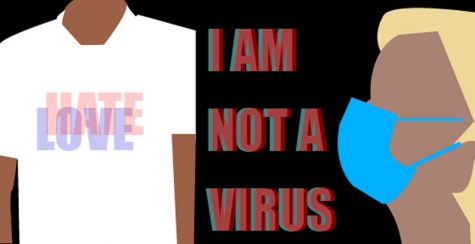Standing in solidarity with those facing discrimination due to COVID-19
Students and faculty experiencing racial discrimination; everyone has a part in this conversation
May 27, 2020

Walking down the aisles of the grocery store to get necessities for the week, Chaplain Lisa Ishihara saw someone coming her direction. Ishihara is an influential member of the SPU community, and works to support the people around her. But at that moment, this person only saw her Asian American heritage, stopped walking and turned around.
This is an experience many members of minority groups experience on any given day and it is no surprise that racism is rearing its ugly head now.
The unconscious bias held against Asian populations in relation to COVID-19 is likely held because of media coverage and fear of keeping families safe. It is no secret that testing positive for COVID-19 could mean weeks without work and the possibility of it spreading to loved ones. But that doesn’t excuse the actions being taken against Asian populations.
“I think that it’s a whole community conversation,” Ishihara said over Zoom.
As a campus, Seattle Pacific University is a community that is embedded in the city of Seattle, and is training leaders to impact this world as a community. Students and faculty need to invest in the communities that they are around and in if everyone is going to be seen as the complete and beautiful person they are.
But the difficult part of starting these conversations is the fact that those facing discrimination cannot be the only ones to speak out against the situation and expect change. Those watching and listening as hurtful words and actions take place have to be willing to get uncomfortable and face the possibility of becoming an outsider for someone else.
“Because we are seeing a couple of demographics more highlighted in the media, it’s to say that that’s someone else’s issue,” Ishihara said.
Just because a few race-based groups are facing the threat of being seen as less-than-human, does not mean that they have to be the one to speak out.
If anyone sees or experiences discriminatory actions, SPU has several support services available, whether it happens on or off-campus.
These services can be found through University Ministries, the Office of Diversity, Equity and Inclusion, the Office of Student Life and the Student Counseling Center.
University Ministries has moved its “Chats with Campus Pastors” and “One-on-Ones” with Ishihara to a virtual format. The Student Counseling Center also holds walk-in sessions virtually and provides a confidential space to talk through your experiences.
The Office of Diversity, Equity and Inclusion connects students with resources and community groups that support students from diverse backgrounds, such as Multi-Ethnic Programs, the John Perkins Center and various on-campus student body groups. Student Life can help facilitate and address on-campus concerns and situations, such as a suitemate or an on-campus resident discriminating against another student.
“Whether that is University Ministries, Dr. Sandy Mayo or anyone in Student Life,” Ishihara said, “there are people who are here to advocate for you and to support you.”
Sophomore nursing major and a double minor in music and psychology, Emily Nguyen, is one of the community members that is crying out alongside classmates, faculty members, family and friends who are facing racial discrimination.
Over email, Nguyen described her own experiences surrounding COVID-19. One impactful moment she had was while she was watching a YouTube video titled “The Year of the Ox- ‘Viral’ MV | Coronavirus Message” from Wong Fu Productions.
Nguyen was stunned to see the beatings and attacks that this video showed.
“I was shocked that this was happening for weeks and I had no knowledge of how bad it is happening to Asian Americans in this country,” she said.
After the shock wore off, Nguyen’s surprise turned to frustration as she asked, “Why was this subject not brought to the public’s attention?”
Paul Kim, Associate Professor in Psychology, who teaches a Cross-Cultural Psychology course each quarter, shed some light on why this subject is addressed with hesitation even though these conversations are important.
“During this time of COVID-19, people are so stressed out about so many things that conversations about race and related issues can feel like yet another thing to do,” Kim said over email.
Some might respond with questions like “Don’t we have enough to worry about now? Why bring this up?”
To add to the complexity of these issues, Ishihara, Nguyen and Kim all expressed a level of uncertainty in the midst of microaggressive interactions.
“Maybe they just needed to turn, but as a person who is experiencing that, the way I look at it is, ‘Well, that person either had some unconscious bias, or maybe they had a fear that was coming up inside of them. Whether it is based on fact or not, that is their particular reality and, unfortunately, that impacts me,’” Ishihara said.
Nguyen expressed heightened awareness of other people’s attitudes towards her.
“The one thing that bothers me the most is the way that people avoid me, but the problem is that I am not sure if it is because of COVID [and] people are practicing social distancing, (some take it more seriously than others) or is it because I am Asian,” Nguyen said.
Likewise, Dr. Kim shared a story about he and his wife walking in a nearby neighborhood and when greeting and waving at a father and daughter, the young girl exclaimed “Daddy, they have the virus!” And the father pulled his daughter aside to talk to her.
Kim said they both left the interaction with questions like “Would she have said that about everyone else who interacted with her father? If it was because we were Asian, where did the girl get this message from? And were we being too sensitive — after all, was this simply a case of a young child who was making a naïve statement? ”
With so much ambiguity in these situations, and during such an uncertain time in history, it can seem impossible to face yet another difficult and desperate societal issue.
As Kim suggests, anyone can be aware of the difficulties that others face, no matter who they are.
“Recognize that there are some shared challenges, but also culture-specific challenges as well during this time,” Kim said. “Be kind toward one another, even if you might not personally understand some of the challenges. Don’t dismiss the experiences of others simply because they are not true of yours.”
For white members of the community who do not face racial discrimination, that means standing alongside those who do and advocating for the common humanity and dignity that everyone deserves.
It means being uncomfortable, crying for the hurting, recognizing the ways one has reinforced or accepted stereotypes,and humbly apologizing for the systems that have dehumanized so many. Making a way for change can look different in many situations, but it has to come from a place of genuine care for others as fellow humans and as equals.
“Hold lament and hope. We can hold both at the same time, and there are seasons where it is right to let ourselves be sad and to grieve and to mourn,” Ishihara said. “And part of that mourning and grieving process actually does hold righteous anger as well.”
























































































